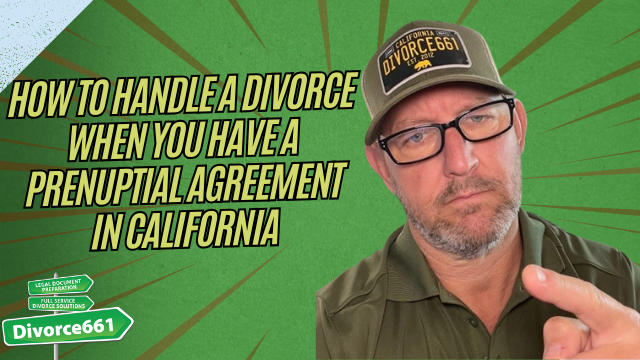How to Handle a Divorce When You Have a Prenuptial Agreement in California
Quick overview
If you are getting divorced in California and have a prenuptial agreement, the prenup can make your divorce faster and less contentious—provided the agreement is valid and properly followed. A prenuptial agreement lays out how property, income, and even support will be handled if the marriage ends. When a prenup checks the right boxes, it lets the parties settle many issues ahead of time so the court and the parties can move forward quickly.
When a prenup makes divorce easier
A properly prepared and executed prenup can streamline a divorce by addressing key issues in advance. Instead of litigating property division or spousal support, the court often simply enforces the agreement and incorporates its terms into the final judgment. This saves time, reduces legal fees, and cuts down on emotional conflict.
Real client example
“Our client in Los Angeles had a prenup that clearly stated each party would keep their own property and waive spousal support. Because the agreement was done properly, the court approved the divorce with no disputes, and it moved forward quickly.”
How California courts decide if a prenup is valid
California courts will generally honor prenuptial agreements when they meet certain standards. The most important elements courts evaluate are:
- Voluntariness: The agreement must have been entered into freely, without coercion or undue pressure.
- Fairness: The terms cannot be unconscionable at the time of enforcement. Extreme one-sidedness can trigger a closer look.
- Full financial disclosure: Each party must have received a fair and reasonable disclosure of the other party’s assets and liabilities before signing. Hidden or undisclosed assets can undermine enforceability.
- Proper execution: The agreement needs to be in writing and signed by both parties. Following formalities helps avoid later challenges.
Common pitfalls that can invalidate a prenup
- Signing under duress or pressure
- Significant lack of financial disclosure by one spouse
- Terms that are unconscionable when enforced
- Failure to put the agreement in writing or failure to sign
How to handle your divorce when you have a prenup
Follow these steps to make sure your prenup helps rather than hinders your divorce:
- Gather the original signed prenup and any related documents.
- Collect financial records and disclosures that were exchanged before or during the marriage.
- Have the agreement reviewed to confirm it is valid and enforceable under California law.
- Ensure the terms of the prenup are accurately reflected in your divorce paperwork and proposed judgment.
- File the divorce paperwork and provide the court with the necessary documentation to incorporate the prenup into the judgment.
How professional help can make a difference
Having experienced representation or guidance matters. A proper review ensures the prenup is applied correctly and that the court will accept its terms. When the agreement is enforceable, the divorce can often be processed quickly and with minimal conflict.
Services that help couples with prenup-based divorces typically offer:
- Review of the prenup for enforceability
- Preparation of court paperwork that reflects the prenup terms
- Flat-fee options to reduce unexpected costs
- Remote support so you can complete the process from anywhere in California
What to do next
If you are divorcing in California and have a prenuptial agreement, start by having the prenup reviewed to confirm it was done properly. Make sure your paperwork accurately reflects the agreement and that all required disclosures were made.
If you want help ensuring your prenup is honored and your divorce moves forward smoothly, schedule a free consultation. We can review your prenuptial agreement, confirm that the terms are properly reflected in your divorce judgment, and handle the filing process so everything is done by the book.
Visit divorce661.com to schedule your free consultation and learn about flat-fee, remote divorce services across California.

